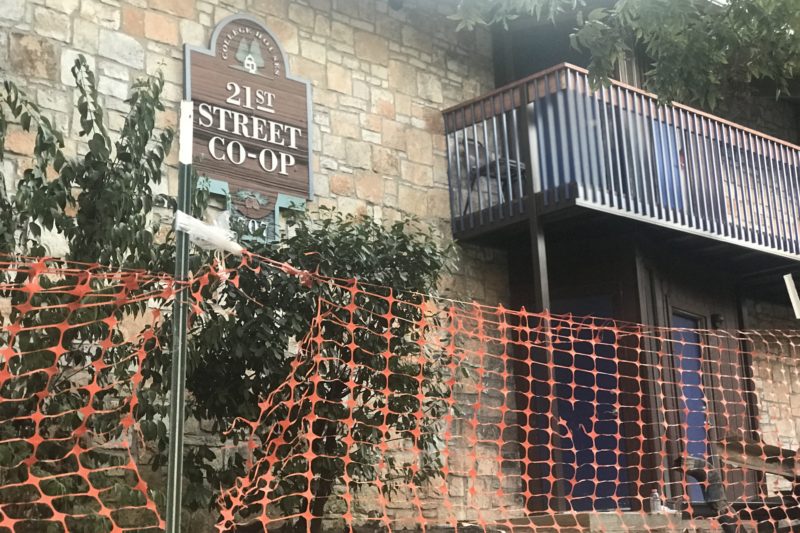Construction Labor Shortage Kept UT Students Living in Limbo

By BROOKE SJOBERG
Students who had planned to live at the 21st Street Co-op for the fall 2019 semester had their move-in delayed by nearly three months.
Extended renovations left around 80 UT-Austin students who were supposed to be living there for the fall 2019 semester in limbo, as the construction was delayed by a labor shortage affecting construction projects across the state. And contractors shortages of skilled labor will continue to be a problem due to a lack of what the industry calls “common-sense immigration policies,” the number of people entering construction and vocational training.
“It is always frightening, kind of going to a new environment,” Radio-television-film student Edward Lambert said. “Now it’s just being staggered and delayed to a certain degree. I’m not really kind of able to form social connections with people at the co-op that I was hoping to make. I’m kind of stuck in this weird liminal zone.”
Repairs to the 20-year-old walkways of the 21st Street Co-op, owned by College Houses, began in June and took more than two-and-a-half months to complete. Lambert said that when he tried to get a room there for the summer, it was unavailable, but showed availability for the fall, so he applied to live there with some friends.
The renovations stretched into August. Then September.
With students having already paid between $3,000 and $8,000 to live in the co-op, College Houses gave them the option of breaking their contract or providing them “better or equal” accommodations at DobieTwenty21 Student Spaces. Some students were given another option: Lambert said College Houses allowed him to remain in the Taos Co-op on the corner of 27th and Guadalupe streets, where he had already been staying for the summer.
The co-op system is similar to having multiple roommates, but on a larger scale. House members split labor, such as cooking and cleaning of the house, in addition to sharing the cost of rent. The College Houses organization is similar in function to a landlord and property manager.
While students wait for renovations to be finished, College Houses has leased several rooms in DobieTwenty21 for them to live in. College Houses owns seven different properties, totaling between 300 and 400 units of living space.
College Houses Community Engagement Coordinator Mark Birkenstock said their contractor, G Creek, has put off their move-in date as a result of a shortage of welders.
“We’re not going to open until the buildings are ready,” Birkenstock said. “We understand. Obviously, the date has moved up, unfortunately, over time. The only thing that’s an official opening date is whenever we get 100% assurances from the contractor of when the certificates of occupancy will be granted, which means it’s safe for people to move in.”
The problem lies with the exterior stairs and walkways that allow students access to the 80 rooms in the eight-building coop. The steel frames that support the walkways had become so corroded that some were in danger of collapsing. Now, welders are removing and replacing about 2,000 feet of the steel support structures. This was done by tearing up the walkways, laying new pipe and re-covering them with concrete. This project was prolonged by areas where leaks had created “puddles” under the walkways and in the foundations of buildings such as their kitchen.
G Creek, a local contractor which handles both municipal and private projects, is having trouble finding enough welders, co-owner Matt Haralson said.
“We had eight to 10 welders every day on the job and that was all we could get. We could have had 20,” Haralson said, adding that a fire marshal would be inspecting the building to certify it for occupancy “soon.”
Students were eventually able to move in to the building during the third week of October.
The latest Federal Reserve Bank of Dallas Texas business outlook survey indicates that G Creek’s shortage of welders is not unique. According to survey, seven in 10 construction firms said they were trying to hire workers, but 87% reported difficulty finding qualified candidates.
The survey also lays out the percentages of Texas construction firms taking major steps to increase hiring. About 58% have increased wages, 50% have intensified recruiting and 33% are offering more training. But there simply aren’t enough people seeking employment.
The Fed study does not indicate whether recent changes in immigration enforcement is contributing to the labor shortage. However, a 2018 workforce survey by the Associated General Contractors of America found that competition for laborers is “driving costs” and pushing completion times ever further.
The AGC survey found that 78% of Texas construction firms reported difficulty finding qualified workers. Construction jobs are opening faster than they can be filled, because of a shrinking supply of skilled workers. The survey called for “common-sense immigration reform” to help hiring in the short term so that the construction industry can work on longer-term recruitment and training of new workers.